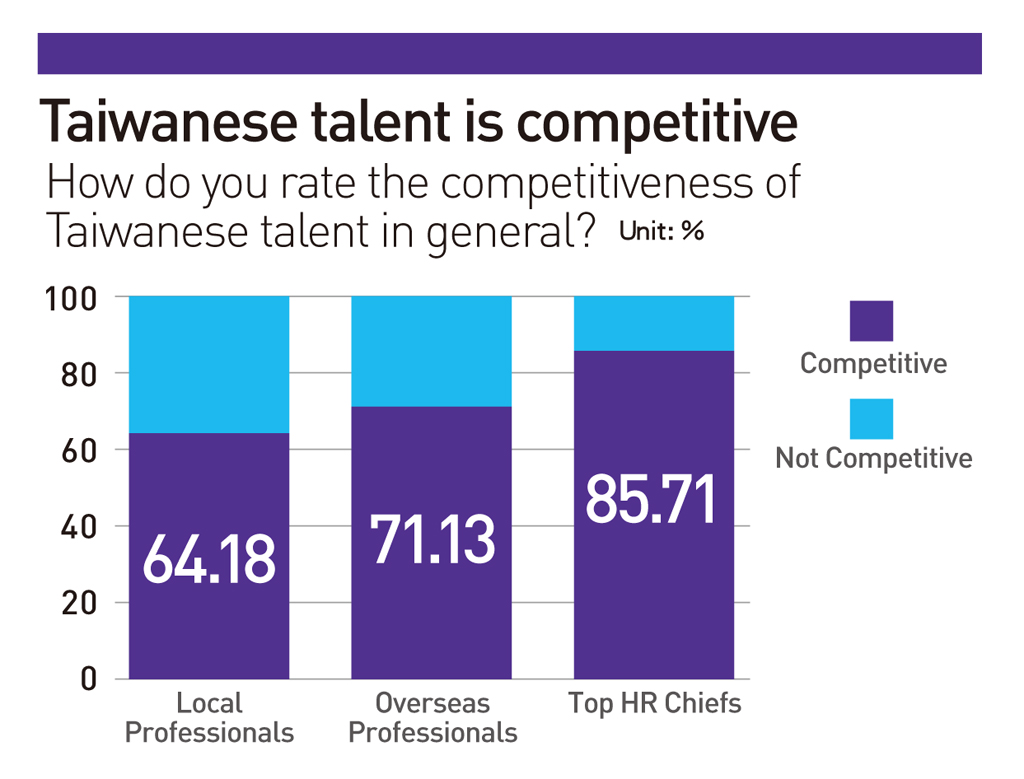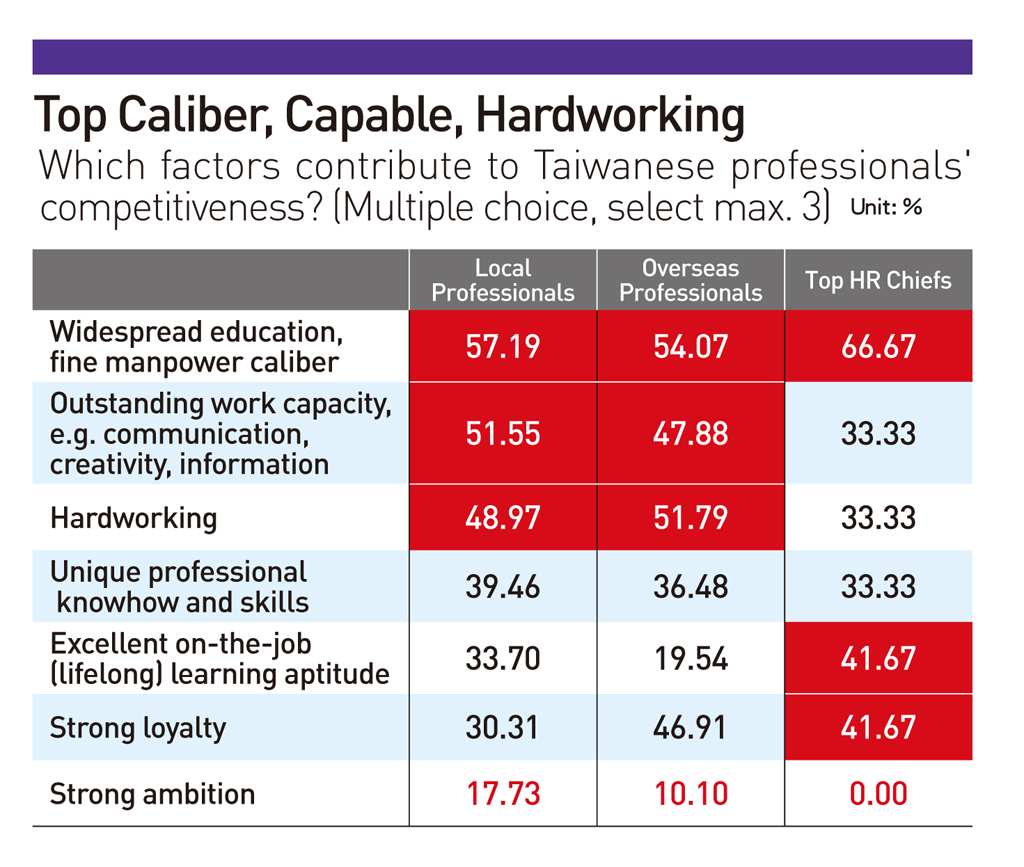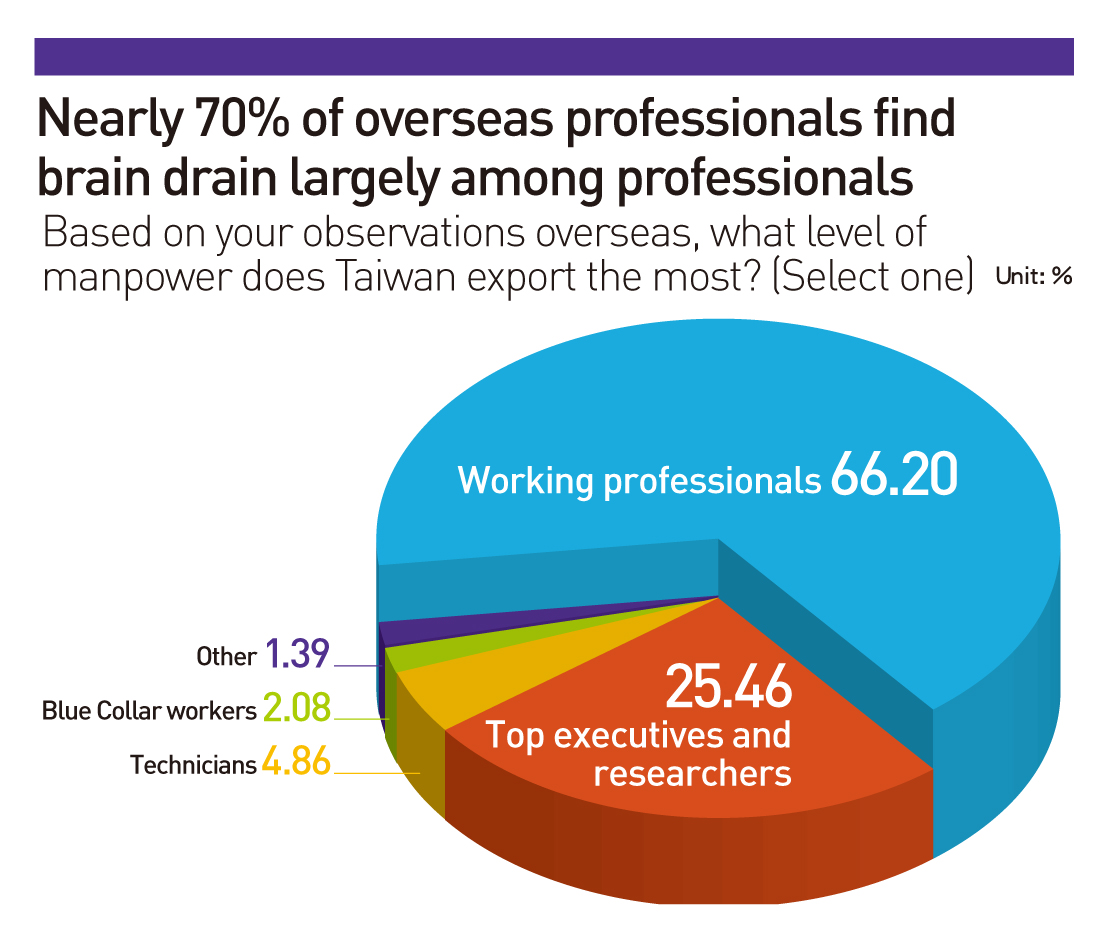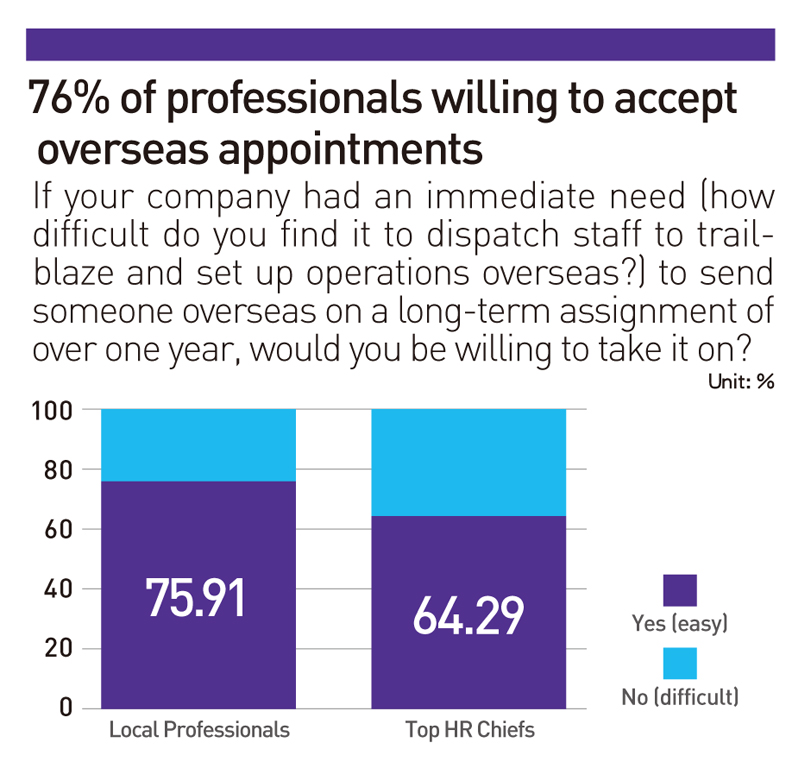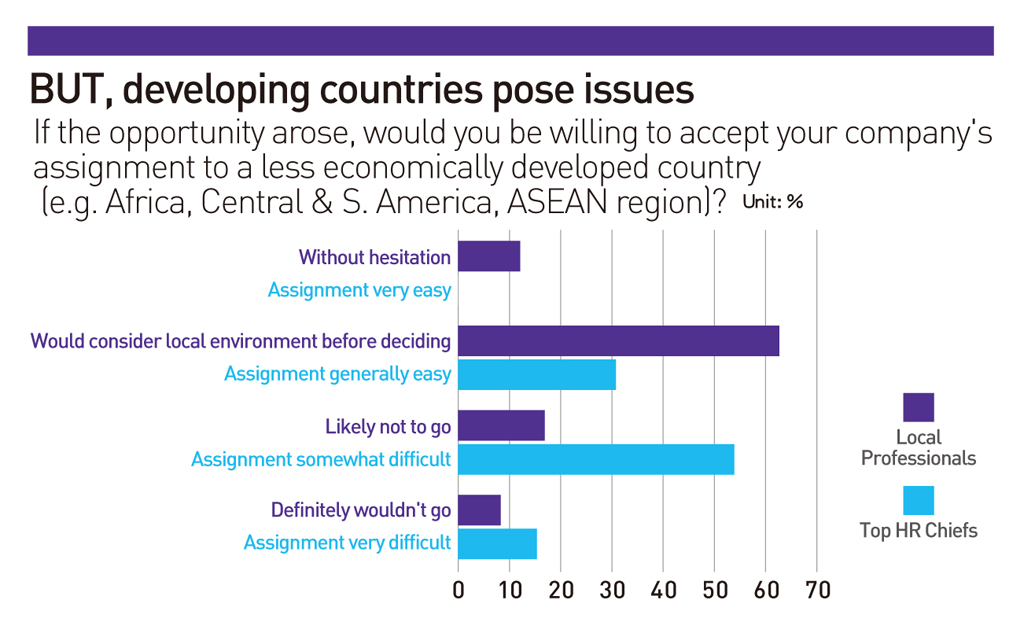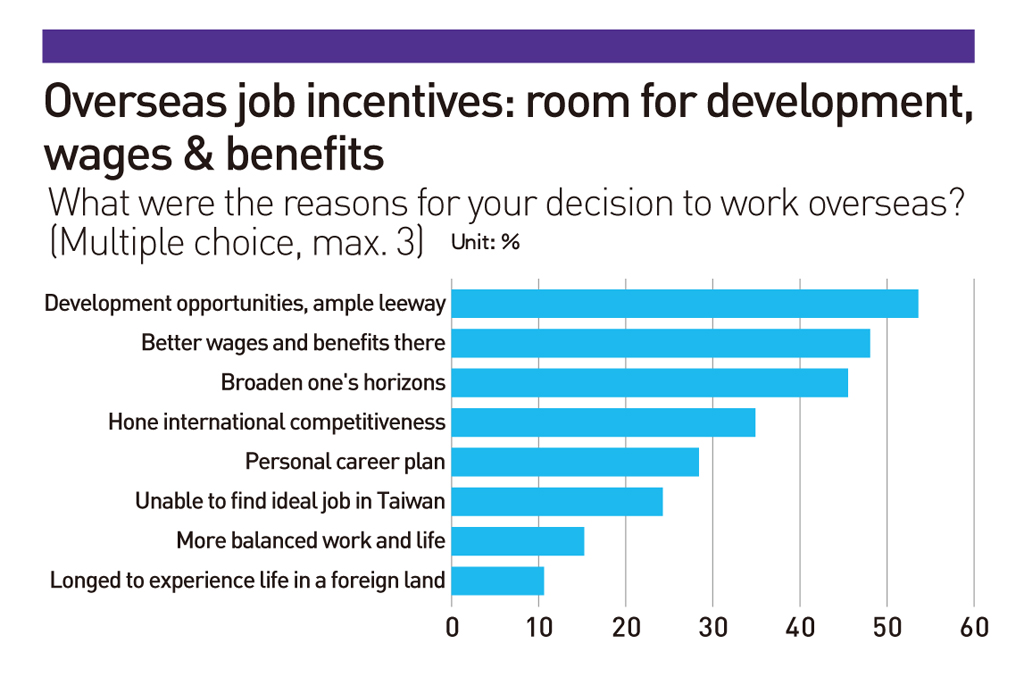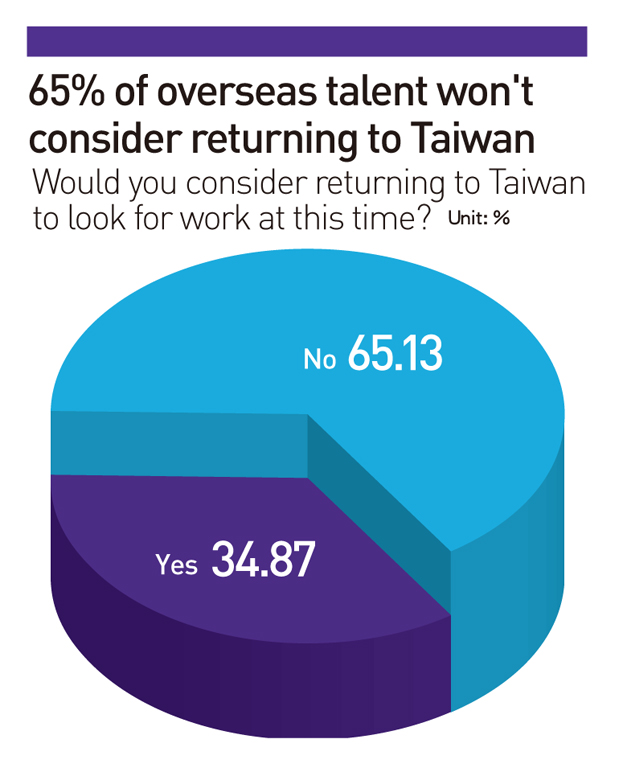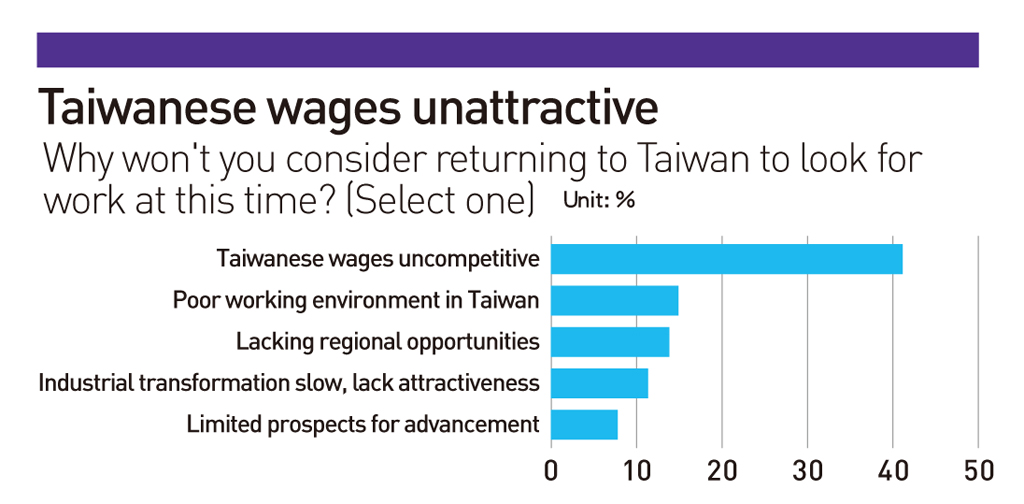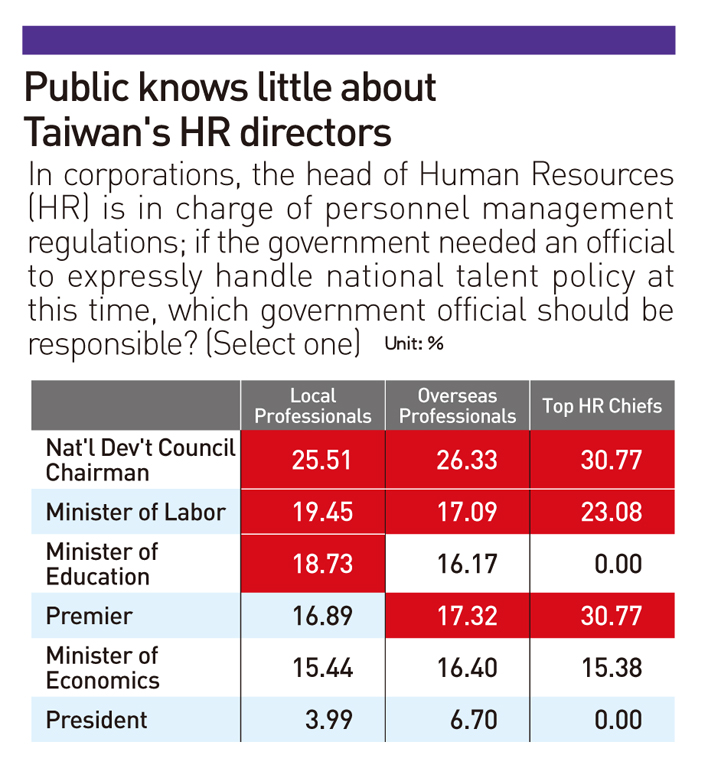2014 CommonWealth Taiwanese Talent Survey
Taiwan's Dire Brain Drain

Source:CW
How competitive are Taiwanese professionals on the international stage? CommonWealth Magazine's latest survey discovered three key factors determining the direction of Taiwanese talent: a stage to perform on, salaries, and ambition.
Views
Taiwan's Dire Brain Drain
By Ting-feng Wu, Chia Lun HuangFrom CommonWealth Magazine (vol. 550 )
Opinions are so varied on Taiwan's talent pool that it can seem like an enigma.
Time waits for no one, however, and based on predictions from business consultancy Oxford Economics' Global Talent 2021 survey, emerging Asian nations will have the most pressing need for talent in the foreseeable future. Notably, Taiwan stands in dire circumstances, with the worst talent imbalance among the 46 countries included in the survey.
Rather than grope around in the dark and simply allow the variety of opinions to fall into cacophony, CommonWealth Magazine initiated a trilateral survey, of human resource directors, overseas Taiwanese workers, and local professionals. (See Survey Method)The survey results indicate that the three categories of professionals have their agreements and differences. At any rate, this is the first step in opening a discourse, and the basis for amassing the energy to move forward.
Hardworking, High Caliber, Loyal
Is Taiwan's talent pool competitive? All three categories of respondents agree that it is.
In order of positivity, the ranking was HR directors (86 percent), overseas Taiwanese workers (71 percent) and local professionals (64 percent). (Table 1)
At first glance this does not mesh with superficial impressions. Why are corporate HR directors, who so often lament the dearth of talent, more sanguine about Taiwanese talent than local and overseas workers?
"Talent cannot be viewed as a whole; rather, you have to focus on the top portion," opines Deryu Yin, vice president of the Human Resources Department at Advantech. A veteran of 25 years of service at Hewlett-Packard and an observer of countless people, she marvels, "Outstanding professionals are more outstanding than ever, more creative, and more international."
What does Taiwanese talent have to offer, then?
HR directors, overseas workers, and local professionals surveyed agree that "broad education" and "excellent caliber manpower" are the main strengths of Taiwanese talent. However, in addition to the infrastructure of the educational environment, both overseas and domestic working professionals rated themselves as having "outstanding performance of professional skills" and being "hardworking." For their part, HR directors are most interested in "good on-the-job learning capabilities" and "strong loyalty." (Table 2)
Lacking Ambition and Confidence
Whilst Taiwanese talent is lauded for its competitiveness, the "industry-academia gap" is frequently bemoaned. Among both local Taiwanese professionals and HR directors, there is broad agreement that this is a factor that causes Taiwanese talent to remain idle and prevents it from being fully utilized.
Even if the industry-academia gap could be resolved, Taiwanese talent is still weak in the "fundamentals." For instance, all three categories of respondents agreed that "ambition" is the weakest point of Taiwanese talent. (Table 2)
Dorothy Tao, senior vice president of human resources at HSBC, laments that Taiwanese professionals "have talent, but lack confidence." Consequently, when they compare themselves with others out in the world, they become reactive and passive.
May Wei, country segment leader of Talent & Rewards Consulting at Towers Watson Taiwan, shares that her company's surveys have found that the top three factors attracting Taiwanese professionals are stable work, regular pay, and convenient work location. "Isn't that the same as 'good pay, a light workload, and a location close to home' (the oft-cited Taiwanese ideal for a job)? Meanwhile, career development was ranked ninth by Taiwanese, in contrast to third among worldwide respondents. This shows how comfortable Taiwanese are."
Monica Han, country HR leader at 3M Taiwan, notes that Taiwanese personnel are "top experts, but not necessarily leadership material." This observation dovetails with those of professionals with overseas working experience, as 66 percent of those surveyed believe that "working professionals" constitute the main force of Taiwan's talent output. (Table 3)
Amenable to Overseas Postings, Except to Backward Countries
Acer company founder Stan Shih once said that if talent that stays in Taiwan makes a contribution of "one," two zeroes can be added after that "one" to their value after internationalization.
In its White Paper on Talent Cultivation released six months ago, the Ministry of Education placed "global mobility" among the top six critical skills for the future.
However, the path to becoming international, added-value talent is a difficult one to take, given the realities of the current professional arena.
For instance, riding high on the success of its overseas market expansion strategy, Chailease Holding Company, the "stock king" with the highest share price in the financial sector, began explosive growth two years ago. Janny Cheng, chief human resource officer at Chailease, notes, "We have 20 overseas branches, with a growth rate of three to five more per year expected in the future."
With this, Cheng is quick to add, "It is difficult to find people for overseas posts."
According to Makalot Corporation's internal figures, there is a "very considerable" gap in the retention rate of local staff in Taiwan and those dispatched to work abroad, as the casualty rate of expat staff is especially high. "Investment in human resources is an expensive venture, from initial recruitment to training, which costs up to NT$500,000 to 600,000 per head," relates Alan Chou, vice president in charge of corporate resources development at Makalot.
A number of corporations anxious to set up overseas operations are haunted by the prospects of human resources' inability to keep pace with enterprise growth.
What is interesting is that a full 76 percent of local respondents claimed they were willing to "accept an overseas work assignment for a year or longer." As for HR heads, 64 percent believe that dispatching staff abroad is a fairly easy task. (Table 5)
At first blush dispatching staff to positions abroad is not difficult in itself, but it is the location to which employees are sent that poses issues. If the assignment is to an undeveloped country (as in Africa, Central or South America, or ASEAN member countries), local survey respondents indicate that they would "consider the environment in the country before deciding" (63 percent). Meanwhile, nearly 70 percent of HR directors describe overseas job assignments as "difficult." (Table 6)
Taiwanese employees and HR directors alike relate that "family" is the main cause of hesitancy over overseas job assignments, including family members' willingness to cooperate, and other major considerations like children's education and care for elderly parents.
In addition, a full 40 percent of local respondents surveyed expressed that "attractive wages and benefits" affect their interest in overseas appointments. Yet only 14 percent of HR directors said that this is a major draw of overseas job assignments, revealing a significant difference of opinion.
Brain Drain Hollows Out Taiwan's Competitiveness
The solution must take account of various factors. Deryu Yin holds that enterprises must make full plans, from wages to family support. She does not hesitate to admit that Taiwanese corporations lag behind the overseas assignment system of foreign companies in this respect.
Janny Cheng also suggests that staff should be dispatched abroad sooner than later to prevent the family factor from becoming an issue. A company with a long history, 3M looks to corporate culture for the solution. "Overseas assignments are a form of validation, as well as a necessary path to promotion," says Monica Han.
Generally speaking, perhaps the opinions of Taiwanese living and working overseas should be taken into account in the search for the greatest common denominator to make overseas assignments smooth. They relate that the leading factors impacting their decision to leave their home country and go abroad were "development opportunities, greater leeway" (54 percent), "better local wages" (48 percent), and "expanding personal horizons" (46 percent). (Table 7)
Reflecting back on Taiwan from their perspectives overseas, an alarming 83 percent of Taiwanese expatriate professionals describe Taiwan today as having become a "talent export country."
As for what kind of talent is draining away, 25 percent of overseas workers believe the top two categories consist of "top executives and researchers." The loss of the highest-caliber assets to overseas positions is an issue worth taking very seriously. (Table 3)
Workers Blame Companies, Companies Blame Government
Getting to the bottom of the situation, both overseas professionals and HR chiefs identify such key issues as "uncompetitive wages," and "more aggressive vying for talent among neighboring countries" (i.e., China, Singapore). However, from this point on, the different groups of respondents part company. Both local and overseas workers further noted major issues including "industry lacks strategies for training and retaining talent," whilst HR chiefs ticked the box next to "government lacks strategy."
So it would appear that both enterprises and the government have work to do.
"The majority of Taiwanese corporations do not take human resources seriously enough," offers Charles Wang, president of Towers Watson Taiwan.
This is also why, when asked, "Do Taiwanese corporations systematically train their personnel?" a full 70 percent of respondents answered, "No," and even half of all HR heads surveyed agreed.
Some are optimistic nonetheless, such as Bing Li, executive director at Wow Prime, who prefers to view "outflow" as "exchange." If these Taiwanese go abroad and return to their homeland one day, they will provide Taiwan opportunities to become more internationalized, Li feels.
If outflow can be turned into an opportunity for exchange, then in addition to a solid personnel training system, Taiwanese enterprises also stand to improve in other areas as well. According to the survey, 48 percent of overseas professionals responded that they decided to take a position overseas due to "better wages and benefits." Moreover, a full 65 percent of those surveyed would not consider returning to Taiwan to seek employment, chiefly because "Taiwanese wages are unattractive." This means that around seven of every ten Taiwanese now working abroad are unwilling to return home. (Table 7, Table 8, Table 9)
"Enterprises are not necessarily unwilling to cultivate talent; the question is whether they can carry it out," explains Deryu Yin. "When corporations are only making a two to three percent profit, their hands are essentially tied."
Joining Forces
Corporations and government alike must step up efforts.
The lament that "the country lacks a talent strategy" frequently voiced in business circles is directed almost entirely at the gap between industry and academia. Bing Li and Monica Han, HR chiefs for a local and foreign company, respectively, were in accord, saying "The government's educational system fails to take industry's needs into account."
An even more serious problem is that even though the Ministry of Education released a Human Resources White Paper near the end of 2013, it failed to register with any of the respondents, who instead insist that "Taiwan lacks an overall talent policy."
How to turn the white paper into an action plan capable of satisfying the needs of both employers and employees remains a challenge.
Interestingly, however, polled as to "which government official is most suitable to expressly handle national talent policy at this time?" (Table 10), the National Development Council chairman received the most affirmative votes, outpolling the ministers of education and labor.
However, upon further analysis, the responsible officials nominated by all three categories of respondents were fairly scattered. This shows that the public is not even sure which parties are in charge of the competitiveness of Taiwan's talent pool, and that strategic thinking is lacking at the highest levels of government, while policy implementation is diffused among various government agencies.
Consolidating inter-agency functions to comprehensively formulate a set of measures spanning education, talent cultivation and recruitment, immigration, and industry policy, is a matter of considerable urgency at this time.
Working professionals are the nation's foundation, especially in resource-poor Taiwan. In an age of intensifying competition and rapid progress among neighboring countries, Taiwanese talent must find the courage to challenge itself, businesses must dare to invest, and the government must summon the mettle to formulate comprehensive plans and policies. Only when all three sides work in concert can they forge Taiwan's future.
Translated from the Chinese by David Toman
About the Survey
The survey was undertaken simultaneously with corporate Human Resource (HR) directors, Taiwanese professionals working overseas, and local Taiwanese workers as its three cohorts. Among these, the CommonWealth Magazine Editorial Department selected 14 top corporate HR directors from various industries and fields for a survey via written questionnaire.
A random sampling was made of both overseas Taiwanese professionals and local Taiwanese workers from the CommonWealth Magazine Group subscriber database who participated in an on-line survey promoted on the CommonWealth Magazine website. The survey was conducted between April 21 and May 19, 2014. A confidence level of 95 percent and a margin of error of plus/minus 1.6 and 4.7 percentage points were attained for local workers and overseas professionals, respectively. A total of 3,861 and 433 valid responses were obtained from local Taiwanese workers and overseas working professionals, respectively.

